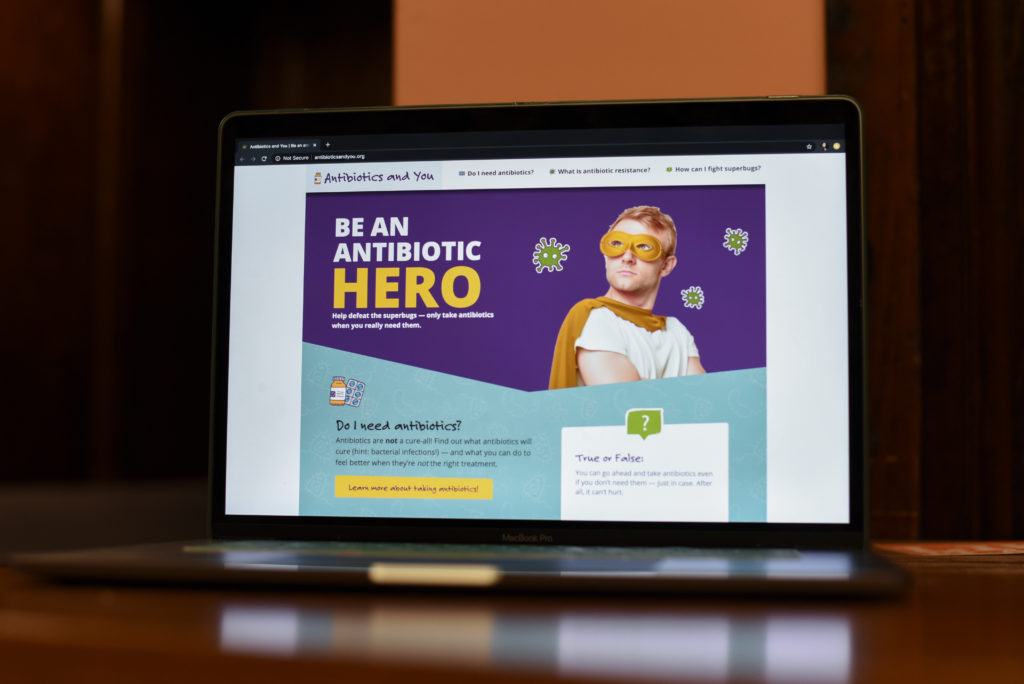The head of an antibiotic resistance research hub developed a website to spread public awareness about the danger of drug-resistant infections.
Laura Rogers, the deputy director of the Antibiotic Resistance Action Center in the Milken Institute School of Public Health, said the “Antibiotics and You” website, which launched late last month, offers educational resources about the purpose of antibiotics and how the public can counteract the proliferation of antibiotic resistance. Microbiology experts said the website will increase public knowledge of antibiotic resistance and preventative strategies as drug-resistant infections become a pressing concern worldwide.
“We created the website to educate people on the crisis we face and to engage them in helping develop solutions,” Rogers said in an email.
The website includes interactive quizzes about when people should use antibiotics and features an “antibiotic superhero” that uses over-the-counter medicines and non-antibiotic treatments to limit the spread of antibiotic resistance.
Rogers said the “overuse and misuse” of antibiotics in people, food, animals and plant agriculture causes drugs to lose efficacy over time. She said procedures like routine surgeries and chemotherapy could become life-threatening and small injuries like a scraped knee could turn into a “deadly” infection if antibiotics intended to treat the illnesses no longer worked.
Rogers said sick patients generally “demand” antibiotic drugs during cold and flu season even though the medicine does not effectively treat viral infections like the common cold. She said the website touches on the “serious” side effects – like a yeast infection, rash and diarrhea – of unnecessarily taking antibiotics.
“We want to arm people with the right information so that, when they go to the doctor and don’t receive an antibiotic, they are happy rather than upset,” Rogers said.
She added that the website’s target audience is patients who visit urgent care clinics. Rogers said patients who visit urgent care facilities typically do not have a close relationship with their health care provider and therefore feel more comfortable demanding antibiotic prescriptions.
She said she and fellow web developers designed the site to be “fun” and “informative” to educate website visitors about antibiotics without inducing panic about antibiotic resistance.
Rogers added that she hopes site visitors will share information they learn about the resistance crisis with friends, family and co-workers to further inform the public about the phenomenon.
“We also hope that the next time they are sick, they won’t demand antibiotics from their caregiver, but instead ask if one is needed and be sure that the provider has conducted an appropriate diagnostic test to determine if the infection was in fact bacterial [antibiotics will help] rather than viral [antibiotics won’t help],” Rogers said in an email.
Microbiology experts said the website will raise the general public’s awareness about how to counteract the spread of antibiotic resistance.
Mohamed Seleem, a Purdue University professor of microbiology, said antibiotic resistance is currently the world’s most “pressing” health issue because bacteria are forming a resistance to antibiotics faster than pharmaceutical companies can produce the treatments. He said researchers must lead efforts to search for new antibiotic treatments because the pace at which bacteria develop resistance financially deters pharmaceutical companies from creating antibiotic drugs.
He added that concerns over drug-resistant bacterial infections could encourage individuals to demand that food producers decrease the use of antibiotics, which could curb the development of antibiotic resistance in microbial organisms.
More than three-quarters of meat and poultry products available in U.S. supermarkets contain “superbugs” – bacterial strains resistant to antibiotics – according to a 2018 report from the Environmental Working Group, a non-profit environmental research organization.
“As researchers, we’re trying to compensate for this gap and try as much as possible to discover new drugs,” he said.
Faramarz Valafar, a professor of epidemiology and biostatistics at San Diego State University, said the prevalence of antibiotic resistance to some diseases differs among countries. He said tuberculosis is not prevalent in the U.S., but resistance to the disease is common in Russia and the Middle East.
Antibiotic resistance mainly occurs when antibiotics treating tuberculosis are “misused or mismanaged,” like when patients are given the wrong dose or do not complete the full prescribed antibiotic treatment, according to the Centers for Disease Control and Prevention. Valafar said the U.S. needs to be prepared for foreign strains, like the coronavirus, that are more difficult to treat.
“Those resistant bacteria from other countries are also going to make it here, and there’s no effective way of preventing that from happening,” Valafar said. “We just need to be prepared.”
Adam Smith, an assistant professor of civil and environmental engineering at the University of Southern California, said antibiotic resistance is concerning because bacteria can easily transfer antibiotic-resistant genes to one another, even if the two bacteria are “not at all alike.”
“The reality of when we talk about this post-antibiotic world that we’re entering is that it’s something inevitable,” Smith said. “We need to start thinking about kinds of alternatives to antibiotics that can combat infection and how we can reduce antibiotic resistance in the environment.”





